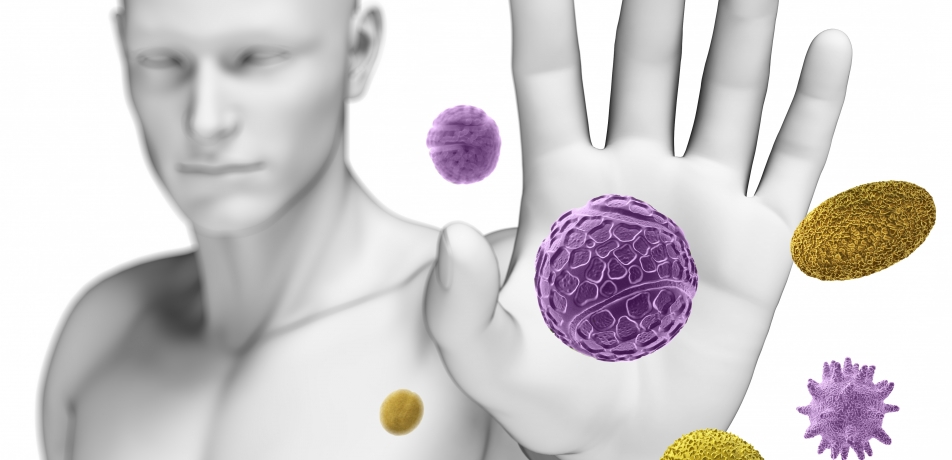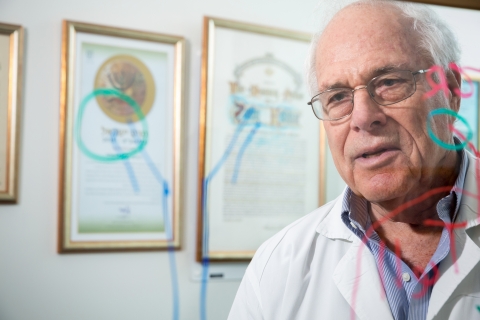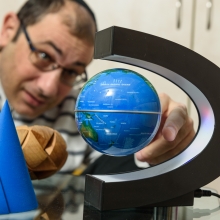A force to be reckoned with
The immune system is the body's police force
Features

Our immune systems keep watch over our bodies from head to toe. Thanks to scientists’ expanding capacity to manipulate this intricate defense force, the world is free—or close to it—of cholera, polio, smallpox, diphtheria, and many more devastating and deadly diseases.
Since the first vaccine—for smallpox—was administered over 200 years ago, the study of the immune system, whose complexity rivals that of our brains, continues to yield new, surprising results every day. Unlocking its secrets helps treat autoimmune diseases, in which the immune system mistakenly attacks the body, and recent studies are pointing to ways of manipulating the immune response to treat cancer.
Weizmann Institute research has always been especially strong in immunology, starting with the findings that led to the production of Israel’s first ethical drug, Copaxone®, for treating multiple sclerosis, through recent advances in cancer immunotherapy, including a new therapy for leukemia, a method for healing damaged lungs, and more. Among the Weizmann Institute faculty who helped establish the foundations of this field are Institute Prof. Michael Sela (see related story), Prof. Ruth Arnon, Prof. Yair Reisner, and Prof. Zelig Eshhar. All of these veteran scholars and the younger scientists following in their footsteps are proving that an intricate understanding of the immune system can lead to major advances for a wide array of diseases and conditions. The examples abound. Prof. Arnon, for one, went on to elucidate a parasitic disease named bilharzia, devise techniques for targeting cancer cells, and, most recently, she is hard at work developing a universal flu vaccine.
The rise of cancer immunotherapy
Why does the body not mount a proper immune response to cancer? Could the body’s natural immune response be heightened and trained to attack cancer cells?
In the 1980s, Prof. Zelig Eshhar of the Department of Immunology was asking these very questions. In his lab at the Weizmann Institute of Science, as well as during a sabbatical year at the U.S. National Institutes of Health, Prof. Eshhar became convinced that the immune system’s T cells - highly focused attack forces - could be extracted from the body, modified to identify and eliminate cancer, then reinserted into the body to go to work. While the cancer research community mostly stuck to the conviction that the body’s immune response was too weak to combat cancer, Prof. Eshhar was single-minded about pursuing his goal.
Over the next two decades, he worked to make that a reality: He developed a technique for removing immune cells known as “killer T cells” from the subject’s blood and genetically engineering them to recognize cells with specific cancerrelated proteins on their outer membranes. The process, called “adoptive cell transfer”, involves engineering the extracted cells with new receptors known as chimeric antigen receptors, or CARs, that are designed to recognize proteins specifically found on tumors. The modified cells are multiplied outside the body and then re-injected into the patient. These T cells successfully target and destroy the tumor cells in a specific kind of blood cancer called acute lymphoblastic leukemia—and leave the healthy tissue untouched.
Then, in 2013, doctors at several leading medical centers in the U.S. (including the University of Pennsylvania’s Abramson Cancer Center, the National Cancer Institute, and MD Anderson) announced that they had adapted Prof. Eshhar’s research and used it on patients with terminal leukemia. When three of the first patients treated in Pennsylvania were completely cured, the news rocked the biomedical and pharmaceutical research communities.
Then, in a study at UPenn last year, 27 out of 29 patients with an advanced blood cancer saw their cancers go into remission or disappear altogether following CAR-T cell therapy.
Prof. Eshhar, who recently was awarded the the 2016 Novartis Prize for Clinical Immunology, is now working with the the Santa Monica, California, company Kite Pharma to develop new cancer immunotherapy applications for other cancers, including pancreatic, breast, and prostate cancer that has metastasized to the bone marrow. And he and several members of the research team who trained with him at the Weizmann Institute are conducting research on treating various kinds of cancer at Tel Aviv Sourasky Medical Center, where he heads a research unit. There, treatment of certain hematological cancers will soon start under the supervision of Kite Pharma. In recognition of his work, he received the Israel Prize in 2015 and the prestigious Massry Prize in 2014.
Healing damaged lungs
Sometimes, a deep understanding of the immune processes that underlie one condition can lead to insight into another, very different one. Prof. Yair Reisner is one of the world’s leading experts in preventing immune system rejection of transplanted stem cells. His methods for using bone marrow from mismatched donors have saved the lives of children born with an immune disease called severe combined immune deficiency (“bubble children”), as well as those of many leukemia patients in various European clinical trials.
When bone marrow stem cells are transplanted, patients first undergo radiation to eradicate the stem cells residing within special compartments in the marrow. This enables healthy transplanted cells to repopulate the compartments and begin producing active new blood cells. Prof. Reisner and his group realized that the lung’s stem cells, which replace worn out and damaged lung tissue, occupy compartments within the lungs that are very similar to those in the bone marrow. They wondered: In cases of severely damaged lungs, for example in advanced cystic fibrosis, could healthy lung stem cells be transplanted in a similar method to that of bone marrow cells? However, not just any stem cells would do the job. The developmental age of the harvested cells mattered. When the team injected embryonic stem cells from around the 20th week into mice with lung damage, new lung tissue began to appear after about six weeks—and a few months later the lungs were healed. The new challenge is figuring out how such cells might be implanted without requiring massive doses of anti-rejection drugs.

Prof. Yair Reisner
Meanwhile, in turns out that in a type of lung condition called chronic obstructive pulmonary disease (COPD), insights on the immune system are leading to answers as well. Prof. Ronen Alon is studying the interplay between tobacco smoke and different immune cells underlying susceptibility of patients to COPD. His studies shed new light on the activities of a protein, the tumor suppressor DAPkinase, that triggers the immune system to prompt damaged cells to commit suicide.
He noticed that this critical protein, missing or inactivated in many tumor cell lines, including certain lung cancers, plays an role in suppressing inflammation. His research on other tumor suppressors such as p53 and their role in lung inflammation will help in the identification of risk factors that predispose people to COPD and to specific lung cancers, as well as assist in the elucidation of new links between inflammation, aging, and cancer.
Building a better antibody
Several recent recruits in the Department of Immunology study how the body’s T cell “police” learn how to distinguish friend from foe. The tiny thymus is the source of the body’s T cells - immune system cells that patrol the bloodstream looking for foreign invaders.
Theoretically, the body could produce over a billion versions of antibodies. That number “is way more than the body will need in a lifetime,” says Dr. Ziv Shulman, who joined the Institute in 2015. “The question is: How does the body choose from all of these possibilities, producing antibodies and tailoring them to specific pathogens, in sufficient quality and quantities?”
Creating antibodies to fight infection involves an intricate dance that takes place in the body’s lymph nodes between antibody-producing B cells and T cells. In these interactions, T cells select B cells to produce antibodies in large quantities, and in random configurations. When an unfamiliar pathogen strikes, a small number of antibodies will grab a piece of the invader and display it, like a war trophy, on the outside of the cell. But sometime between identifying the invader and mounting a all-out attack, B cells become honed to precisely identify and efficiently destroy the pathogen.
B cells are the only immune cells in the body that purposely mutate their genomes. It takes another type of cell, which Dr. Shulman dubs the “instructor,” to select those cells that have mutated their antibody encoding genes in the right direction - towards sporting the most war trophies - and get them to divide and move out of the lymph node “training grounds” and into the bloodstream.
Dr. Shulman focuses on the communication between B cells and their instructors. Understanding this stage of the immune response, he says, may lead to the development of ways to control it. For example, he and his team are investigating the communication between immune cells that keep the gut bacteria contained within the intestines. This could lead to new treatments for such diseases as Crohn’s, in which the gut is “leaky,” or to oral immunizations for infectious diseases.
They are also creating a method to identify antibodies in cancer patients’ B cells. This will allow production and testing of antibodies in the lab and will be adaptable to various treatments, including the antibody component of the CAR-T method developed by Prof. Eshhar.
Teaching tolerance
A number of the most successful drugs to arise from Weizmann Institute research treat autoimmune diseases—those diseases that occur when the immune system mistakenly attacks the body. These include Rebif®, developed by Prof. Michel Revel, which applies an immune system molecule called interferon beta to treating MS. As well, the work of Prof. David Wallach on inflammatory substances called cytokines led to the development of several drugs, for such autoimmune diseases as rheumatic arthritis and psoriasis.
New research in this area is extensive. Prof. Idit Shachar, Head of the Department of Immunology, is studying, among other things, the immune system's role in rheumatoid arthritis, an autoimmune disease.
The basic science revolves around the fact that immune system T cells must be “taught” not only how to recognize a foe, but also how to tolerate the body’s own components. If T cells don’t learn these lessons well, it can lead to damaging autoimmune reactions, which may ultimately result in various diseases, such as type-1 diabetes or multiple sclerosis.
The most critical steps in the process of teaching tolerance to T cells take place in their nursery - the thymus. Strikingly, this process is regulated primarily by a single gene, the autoimmune regulator Aire, which Dr. Kobi Abramson studies extensively. It turns out that Aire is quite a busybody in the thymus, for it not only drives expression of thousands of genes ectopically - in a place where they are not normally found—but most importantly it allows the body to get rid of self-reactive T cells that would otherwise cause autoimmunity.
From cancer to Alzheimer's
Cancer immunotherapies essentially "turn on" the patient immune system such that exhausted T cells can zero in on the tumor and destroy it. Cancers stop T cells from attacking them, and cancer immunotherapy techniques involve ways to block these inhibitory mechanisms, so that T cells and other immune cells can go back to doing their job and destroying the tumor - as Prof. Zelig Eshhar has successfully done. The current challenge is to understand with greater precision these inhibitory mechanisms - so-called "check-points" - that keep T cells from becoming too numerous and aggressive. In addition, it is still not clearly understood which patients will respond to the existing therapies and which patients will require other types.
Dr. Ido Amit of the Department of Immunology is investigating both of these avenues, which involves identifying the diverse composition of cells and pathways within the tumor ecosystem. To this end, he and his team have developed an experimental and analytical method called "massively parallel single-cell RNASequencing" for measuring the genomic content of hundreds of thousands of cells simultaneously. In investigating one such check point which is relevant in cancer, his team, together with Prof. Michal Schwartz of the Department of Neurobiology, found something surprising: That inhibiting this pathway also prevents the neurodegenerative effects in Alzheimer's disease—opening the way for new approaches to fighting neurodegenerative diseases.
Prof. Ronen Alon is funded by Mr. and Mrs. William Glied, Canada, Herbert L. Janowsky Lung Cancer Research Fund, The Henry Chanoch Krenter Institute for Biomedical Imaging and Genomics. Prof. Alon is the incumbent of the Linda Jacobs Professorial Chair in Immune and Stem Cell Research.
http://www.weizmann.ac.il/immunology/Alon
Prof. Zelig Eshhar is funded by Comisaroff Family Trust, Leona M. and Harry B. Helmsley Charitable Trust.
Prof. Yair Reisner is funded by Friends of Michael Baker, Canada Ș Leona M. and Harry B. Helmsley Charitable Trust, Roberto and Renata Ruhman, Brazil. Prof. Reisner is the incumbent of the Henry H. Drake Professorial Chair of Immunology.
Dr. Ziv Shulman is funded by The Benoziyo Endowment Fund for the Advancement of Science, Irma & Jacques Ber-Lehmsdorf Foundation, The Sir Charles Clore Research Prize, Comisaroff Family Trust, The Morris Kahn Institute for Human Immunology, Rising Tide Foundation.

Prof. Zelig Eshhar

Dr. Ziv Shulman








